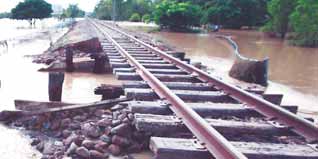By John Miller, Australian Editor
The impact of devastating floods in the
Australian state of Queensland will be felt by
the global coal industry for many months.
The inundation is expected to cost the
state’s coal industry at least $1 billion in lost
production with the cost of repairs likely to
run into hundreds of millions. Inter-
nationally, coking coal supplies will be limit-
ed with prices already increasing, an effect
that is flowing on to the steel industry, cre-
ating pressure on production and prices.
The flooding in December and early
January affected much of Queensland,
including the Bowen Basin coalfields in the
center of the state and the Surat Basin to the
south, and covered an area greater than the
size of Germany and France. It was brought
about by above average rainfall saturating
catchments, followed by a tropical cyclone
dumping near-record rain on many coastal
and inland areas, and came at the start of
the wet season, which traditionally brings
consistent rain and a number of cyclones.
The floods swamped mines and dam-
aged transport links, paralyzing operations
that produce 35% of Australia’s estimated
259 million metric tons (mt) of exportable
coal. Australia contributes two-thirds of
global coking-coal exports.
Queensland Resources Council (QRC)
Chief Executive Michael Roche said the
export of coal to countries in Asia and Europe
has been delayed due to damage caused to
railways linking mines to the state’s shipping
ports. This has raised fears of a global coal
shortage as well as increasing the pressure
on Chinese authorities trying to battle mount-
ing inflationary pressures without causing
the economy to slow too severely.
The Queensland coal industry now
faces an elaborate logistics exercise to get
its product to market, with mines to be de-
watered, mine infrastructure to be
repaired and rail, road and port links to be
re-established.
 As flood waters receed, the damage to rail lines becomes more apparent.
As flood waters receed, the damage to rail lines becomes more apparent.
Wood Mackenzie Analyst Ben Willacy
estimates about 46 mines have been
affected directly or indirectly. These mines
account for 91% of Australian hard coking
coal exports and 100% of (pulverized coal)
exports. Based on his estimates, Australia
would lose 14 million mt of exports if each
of the mines was unable to operate for a
month.
A number of miners including Rio Tinto,
BHP Billiton, Xstrata, Vale, Anglo
American, Peabody Energy, Cockatoo Coal,
Macarthur Coal, Aquila Resources and
Ensham Resources declared force majeure
over mines while other companies in the
Bowen and Surat basins, including Caledon
Resources, Wesfarmers and Bow Energy,
were impacted directly or indirectly at or
near their operations.
The largest Bowen Basin port, Dalrymple
Bay, is slowly recovering after being forced
to operate at 60%
capacity owing to the
passage of coal trains
being blocked by
floods and rail line
damage. Another large
port, Gladstone, was
forced to close for
some time after
exhausting supplies of
stockpiled coal. Other
export ports at Hay
Point and Abbot Point were also impacted
but both are now operating at full capacity.
The Blackwater coal rail system was
inundated, cutting off the major supply
line to Gladstone, the world’s fourth-largest
coal export terminal which normally
exports 1.3 million mt/week. In the first
week of January there were 18 vessels at
anchor off the port with a further 12 ships
expected in the following days.
Analysts expect coking coal prices to rise
as much as a third, from US$246 to
US$330/mt in the aftermath of the floods.
Macquarie Commodities Research said this
could be reflected in the next round of quar-
terly export contracts while limited avail-
ability could also generate a steel shortage
and a strong increase in the price of steel.
The impact will be greatest in China
and the rest of Asia, which depends heavi-
ly on coal from Australia to make steel and
feed electric utilities. Also affected will be
buyers around the world who rely on Asian
steel. Integrated steelmakers, who produce
steel by melting raw materials such as iron
ore and coal, have already been hit by ris-
ing iron ore prices.
One obstacle preventing companies
from resuming full production as soon as
possible is they are only permitted to pump
some water out of pits and into the still
flooded rivers. Anglo American said it
could take some weeks to pump water out
of its flooded mines.
“It’s going to take some months to
come back fully online,” said Queensland
Mines Minister Stephen Robertson.
As featured in Womp 2011 Vol 01 - www.womp-int.com

